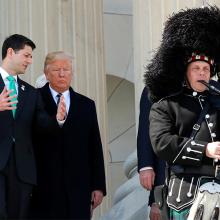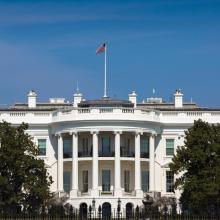state department
President Donald Trump will announce on Wednesday that the United States recognizes Jerusalem as the capital of Israel and will move its embassy there, breaking with longtime U.S. policy and potentially stirring unrest.
The State Department will retain its special envoy on anti-Semitism, a position some Jewish groups feared the Trump administration would eliminate. The envoy handling HIV/AIDS will also be retained, but many others will not survive cuts at the department, which plans to scrap 30 of the 66 current “special envoy” positions, including one that handles climate change issues.
Daniel Kammen, a professor at the University of California, Berkeley, said in a letter posted on his Twitter account that Trump had failed to condemn white supremacists and neo-Nazis, part of "a broader pattern of behavior that enables sexism and racism, and disregards the welfare of all Americans, the global community and the planet."
It was her desire to hear the stories of real people — “not just faceless refugees or immigrants” — that brought the Rev. Elizabeth A. Eaton to a refugee resettlement agency that provides a range of services to refugees in the Chicago area.
“Especially now, when there’s this fear that’s been stirred up, and anti-refugee sentiment, it’s really critical to say, ‘No, these people are our grandparents, our aunts and uncles,” said the presiding bishop of the Evangelical Lutheran Church in America, the nation’s largest Lutheran denomination.
The State Department is set to approve the Keystone XL pipeline by Monday, Politico reports. The cross-border permit that will allow construction to proceed is set to be signed by Undersecretary for political affairs Tom Shannon just before the end of the 60-day timeline President Donald Trump called for in January.
Religious leaders, including some who spoke at President Trump’s inauguration, are calling on Congress to protect foreign aid that helps the needy across the globe.
Trump’s 2018 budget proposal calls for $25.6 billion in funding for the State Department and the U.S. Agency for International Development. That’s a decrease of $10.1 billion, or 28 percent, from the 2017 budget.
On March 16, the Trump administration released President Donald Trump’s proposal for the 2018 federal budget, revealing a list of significant cuts to various federal agencies, including the Environmental Protection Agency, the State Department, and the Department of Education.
Following a report that President Trump is thinking of scrapping the ambassador position assigned to combat global anti-Semitism, a bipartisan group of 167 U.S. House members sent a letter asking him to appoint one soon.
The letter, released on March 13, asks Trump to “maintain and prioritize” the appointment, in a time of rising anti-Semitism.
The former U.S. religious freedom ambassador told a congressional subcommittee that leaked language of a proposed presidential executive order on religious liberty could cause “constitutional problems.”
“I think it raises very serious equal protection issues,” said Rabbi David Saperstein, who recently ended his tenure at the U.S. State Department.
President Trump is reportedly considering naming former Baylor University President Ken Starr to head the State Department’s Office of International Religious Freedom.
The ambassador-at-large for international religious freedom monitors religious persecution and discrimination worldwide, and develops programs to promote religious freedom, according to the State Department website.
Receiving a prestigious human rights prize, an Iraqi lawmaker, who gained international attention for her oppressed Yazidi religious minority, decried the Trump administration’s “unfair” executive order on immigration.
When President Obama signed a newly strengthened international religious freedom act on Dec. 16, the intention was to protect religious believers around the world.
But the freshly signed act is being heralded by some legal scholars as a different milestone — for the first time, atheists and other nonreligious persons are explicitly named as a class protected by the law.

Unidentified Syrian refugees on the Turkish - Syrian border. thomas koch / Shutterstock.com
The U.S. State Department warned that religion-based terrorists as well as some governments across the globe are threatening the liberties of religious minorities.
“One of the best ways to deny these murderers their victory is by ensuring that those they have sought to destroy not only survive, but thrive,” said Deputy Secretary of State Antony Blinken, announcing the 2015 Annual Report on International Religious Freedom on Aug. 10.

Photo via Dmitry Kaminsky / Shutterstock
U.S. Embassy worker Xulhaz Mannan was murdered April 21 in Dhaka, Bangladesh's capital, according to the U.S. State Department.
Local reports say Mannan and another man were hacked to death. There is some suspicion this violence was provoked by Mannan's LGBT activism.

A Yazidi volunteer with the Kurdish peshmerga. Image via REUTERS/Azad Lashkari/RNS
The Knights of Columbus has issued a 280-page report declaring that the Islamic State group is committing “genocide” against Christians and other religious groups in the Middle East and urging the U.S. State Department to use that term to describe its actions. Knights of Columbus CEO Carl Anderson said his Catholic fraternal organization, working in partnership with the group In Defense of Christians, does not contend Christians alone are facing genocide from the group known as ISIS but it believes the State Department must include them.

Image via wong yu liang / Shutterstock
Three years ago, I was a U.S. State Department officer deployed to Turkey to work with the Syrian opposition. It was an amazing opportunity to support Syrian activists and civic leaders waging an improbable — yet remarkable — popular struggle, against a criminal regime that responded to peaceful protests with bullets and torture. For [the previous] eight months since the start of the revolution in March 2011, Syrian activists — Sunni, Christian, Kurdish, Druze, and Alawite — had used demonstrations, sit-ins, resistance music, colorful graffiti, online satire, and dozens of other nonviolent tactics to challenge the Assad regime. My task, along with that of my U.S. government and international colleagues, was to aid their efforts.
A year earlier, I co-wrote and published a book with Erica Chenoweth, called Why Civil Resistance Works: The Strategic Logic of Nonviolent Conflict. In it, we tested the conventional wisdom that only violence works against formidable foes like dictatorships and foreign military occupations. In studying 323 violent and nonviolent campaigns from 1900-2006, Erica and I found that nonviolent civil resistance was twice as successful as armed struggle — even against militarily superior opponents willing to use violence. We also found that nonviolent struggle helps consolidate democracy and civil peace.
Randy Berry, 50, is the U.S. special envoy for the human rights of lesbians, gay men, bisexuals, and transgender people, the first such post ever created by a nation, according to the State Department.
In that trailblazing role, he said, he has an opportunity to help his two children grow up in a world more accepting than the one he was born into.
As someone who has “walked the personal journey of coming out,” Berry said, he knows how crucial positive messages and support are to a U.S. and global LGBT community plagued by young suicides.
President Obama on Monday said he plans to tap Rabbi David Saperstein as the next ambassador-at-large for international religious freedom, the first non-Christian to hold the job, which was created in 1998.
As ambassador, the man named as the most influential rabbi in America by Newsweek magazine in 2009, will head the State Department’s Office of International Religious Freedom, and will be tasked with monitoring religious freedom abuses around the world.
“When it comes to the work of protecting religious freedom, it is safe to say that David Saperstein represents the gold standard,” said Secretary of State John Kerry, announcing the nomination at the State Department.
A Reform rabbi and lawyer, Saperstein, 66, has led the Religious Action Center of Reform Judaism for 40 years, and has spent his career in Washington, focusing on social justice and religious freedom issues. He was instrumental in the 1993 passage of the Religious Freedom Restoration Act, which requires the government to show a compelling reason for any action that impinges upon the exercise of religion.
The U.S. needs to quit its crude oil habit. TransCanada needs to see the individuals whose health is directly threatened by Keystone XL. The president and legislators alike need to act for the welfare of not only this generation but for the generations to come, if we indeed want to see the flourishing of future generations. We need to admit to our addiction to oil and identify its harmful ecological impact for what it is.
As a person of faith, I want to see our landscapes, waters and skies restored to wholeness. I am compelled by the love I’ve received from God and God’s people to work alongside others for the common good of all. Having experienced the crisp June evenings of Minnesota as well as the asthma-inducing smog of Hong Kong, I know both the beauty of fresh air and green spaces and the dullness of pollution and gray skies. The chances of enjoying the former are quickly dwindling at our current rate of oil consumption, but we still have time to prevent further environmental degradation, if not for future generations then at least for those of us who still look forward to the rest of their lives, no matter our age.
Friday at 3 p.m. ET, the State Department released their long-awaited final Supplemental Environmental Impact Statement of the Keystone XL pipeline extension, a proposed project from TransCanada to build a new pipeline for transporting tar sands crude oil from Canada to a refinery in Texas where it will likely be exported internationally.
Environmentalists and concerned citizens on the pipeline’s pathway have been waiting for the State Department to address previously ignored issues like the pipeline’s impact on climate pollution. President Obama said in a climate-focused speech last year that he would only approve Keystone XL if it did not pose a significant risk of climate pollution, so although State Department looked at other environmental risks as well (such as the 1,692 pipeline spills or incidents that occurred from 2002 to 2012 in the United States). This review concludes that the number of U.S. jobs to be created – once estimated in the tens of thousands – will actually be 50 operations jobs, with only 35 permanent. The rest (the touted 42,000 number) are all temporary construction jobs.














